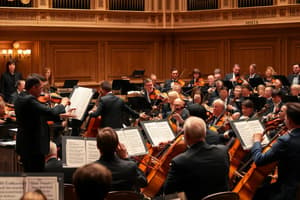Podcast
Questions and Answers
What distinguishes the concerto from the symphony in terms of structure?
What distinguishes the concerto from the symphony in terms of structure?
Why is the classical symphony considered the highest form of music in the Classical Period?
Why is the classical symphony considered the highest form of music in the Classical Period?
What distinguishes chamber music from other forms of music?
What distinguishes chamber music from other forms of music?
What role does a 'Cadenza' play in a classical concerto?
What role does a 'Cadenza' play in a classical concerto?
Signup and view all the answers
Which composer is known for his extensive output of string quartets and symphonies?
Which composer is known for his extensive output of string quartets and symphonies?
Signup and view all the answers
How did Mozart showcase his musical talent at an early age?
How did Mozart showcase his musical talent at an early age?
Signup and view all the answers
What type of music did Mozart's father expose him to?
What type of music did Mozart's father expose him to?
Signup and view all the answers
How did Beethoven contribute to musical forms?
How did Beethoven contribute to musical forms?
Signup and view all the answers
What distinguishes Opera Buffa from Opera Seria?
What distinguishes Opera Buffa from Opera Seria?
Signup and view all the answers
In what way did Beethoven enrich the orchestra?
In what way did Beethoven enrich the orchestra?
Signup and view all the answers
Which musical form did Opera Seria emphasize?
Which musical form did Opera Seria emphasize?
Signup and view all the answers
What kind of performances reflect the social changes of the period?
What kind of performances reflect the social changes of the period?
Signup and view all the answers
Study Notes
Classical Music Forms
- A classical symphony is a lengthy composition for orchestra, consisting of multiple sections called movements.
- It is considered the highest form of music in the Classical Period due to its complexity and large layer of timbre and instrumental sections.
Concerto
- A concerto is a composition with three movements, beginning with a sonata-allegro comparable to the classical symphony.
- In the Classical Period, concertos were written for the keyboard or other instruments of the orchestra, due to the limited availability of instruments.
- The "Cadenza" is a highlight of the concerto.
Chamber Music
- Chamber music does not require a conductor, as musicians are sensitive enough to coordinate.
- Examples of chamber music include a string quartet, string quintet, piano trio, and others.
Renowned Composers
Franz Joseph Haydn
- Haydn was a prolific composer, with creative works including:
- 108 symphonies
- 68 string quartets
- 32 divertimenti for small orchestra
- 126 trios for baryton, viola, and cello
- 29 trios for piano, violin, and cello
- 21 trios for two violins and cello
- 47 piano sonatas
- 20 operas
- 14 masses
- 6 oratorios
- 2 cello concerti
Wolfgang Amadeus Mozart
- Mozart was considered a musical prodigy, showcasing his musical ability at an early age.
- He and his sister played as child prodigies in the imperial courts in Vienna and Prague.
- Mozart came from a musical family, with his father being a violin teacher and leader of the local orchestra.
- His father exposed him to countless musical performances and taught him to play and write music.
Ludwig Van Beethoven
- Beethoven was an innovator of musical forms, widening the scope of the symphony, sonata, concerto, and quartet.
- He enriched both the orchestra and the quartet with a new range of sonority and variety of texture, and expanded their forms.
Vocal Forms
Opera Buffa
- Opera Buffa, also known as Comic Opera, is a bright, sentimental, funny, and exciting performance.
- It reflects the social changes of the period, featuring stories about real people in real situations, often performed in a comic or funny manner.
Opera Seria
- Opera Seria, also known as "serious opera", is an opera with the emphasis on very ornamented arias rather than plot line.
- It features ancient heroes and nobility, and is characterized by its ornate and elaborate style.
Studying That Suits You
Use AI to generate personalized quizzes and flashcards to suit your learning preferences.
Description
Test your knowledge of multi-movement forms in classical music with a focus on symphonies and concertos. Learn about the structures, movements, and characteristics of these grand orchestral compositions from the Classical Period.




